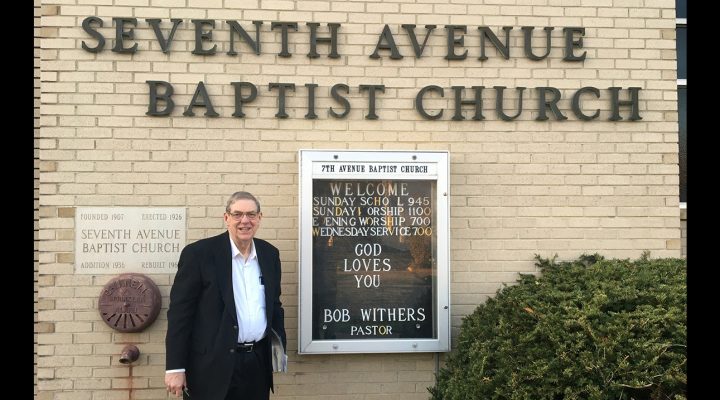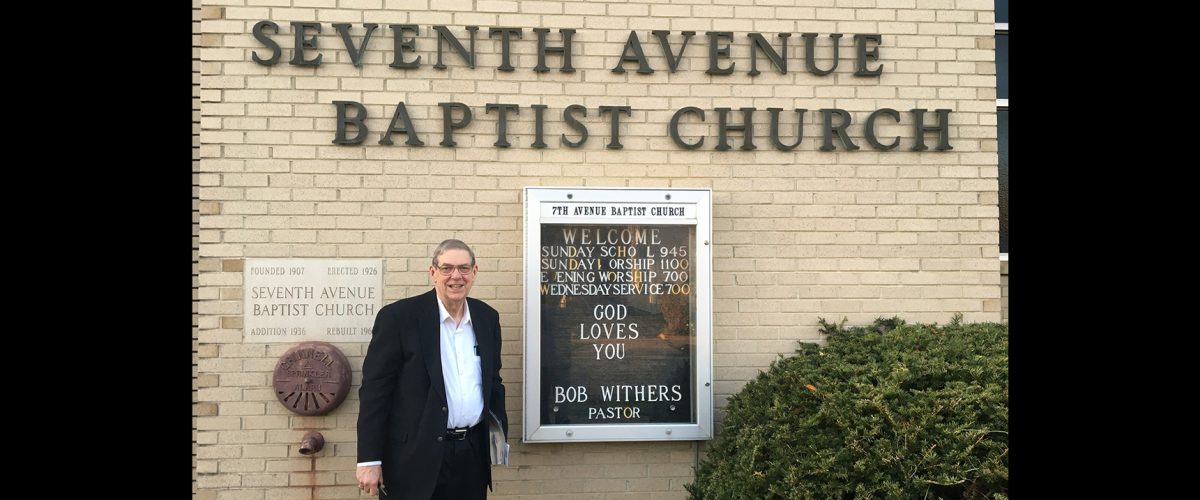“Would you be willing to come and preach a revival for us?” my dad asked when I answered the phone that day driving down Main Street (hands-free, of course). I asked him specifically what he was looking for and he said, “We need to be revived.”
Don’t we all?
My dad serves as pastor of Seventh Avenue Baptist Church in Huntington, W.Va., and has for nearly 40 years. I grew up in that church but have since moved to Virginia. I thought about his question a bit and I asked him if he would consider allowing me to bring some of the folks from my church with me, and we could do more of a retreat than a revival. My team could help lead workshops with more back and forth conversation instead of simply preaching. He talked to his people and said, “I think that could work.”
I started asking folks who I believed would be assets to our team to consider going on a mission trip of sorts to my home church. And with very few exceptions, one person after another kept saying yes. It took very little convincing. And thus, we began to plan the trip.
Revive us again?
My dad had said his church needed to be revived. I think we all can relate to that. But his church has been struggling for some time. Their attendance high this year on Easter Sunday was 37.
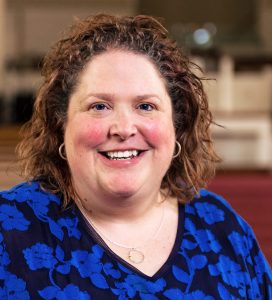
Eli Withers
Now, certainly, it’s not just about the numbers (some of the most amazing pastors I know are leading small but effective, and even fruitful, congregations). But let’s be real: When you have a large facility (that once was filled with bustling activity and lots of bodies) and now needs more upkeep than your people can keep up with, numbers matter a little.
Our team decided we wanted to go and be encouragers to my dad and his congregation.
Our team from Harrisonburg Baptist Church had some firsthand experience with the issues facing my dad’s church. Our congregation had just celebrated its 150th anniversary in 2019. We spent a year looking at where we had come from, where we were currently (between senior pastors) and a lot of considering who and what God was calling us to be in the future. The momentum of that year-long celebration helped propel us through the challenging time of a pastor search and helped prepare us for the next chapter of our journey.
Much of the celebration of our anniversary year was inspired by the book Hopeful Imagination by Mike Queen and Jayne Davis. This book tells the story of how a traditional downtown church, First Baptist Wilmington, N.C., learned to adapt and grow into a church God could use in the 21st century — not simply remaining an established church that wanted to hold on to the way it always had done things.
Because of this book, we spent time celebrating what most would call the “glory days” of our church. We told sacred stories of our time in this place (what brought us here and what kept us here). We acknowledged various struggles the church had known. We asked God for forgiveness in the many places where we had fallen short over the years and for the mistakes we had made.
“We were challenged to see that the church of today, and certainly tomorrow, may in many ways looks different from the church of the past. But the gospel remains the same.”
And as our pastor search committee continued to go through the process for which we had commissioned them, we considered who God was calling us to be now and well into the future. We were challenged to see that the church of today, and certainly tomorrow, may in many ways looks different from the church of the past. But the gospel remains the same. We asked ourselves what that meant for us.
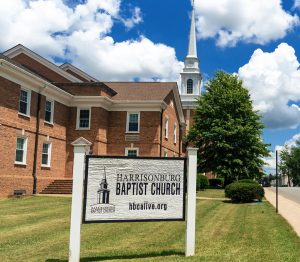 In addition to strengthening our congregation, this work prepared us for a mission trip we didn’t yet know we were going to take. We were surprised to find out Mike Queen, who is originally from the Huntington area, attended my dad’s church as a teenager.
In addition to strengthening our congregation, this work prepared us for a mission trip we didn’t yet know we were going to take. We were surprised to find out Mike Queen, who is originally from the Huntington area, attended my dad’s church as a teenager.
Seeing through new eyes
It is an odd feeling to see your home through the eyes of another. I had taken friends and other mission teams to my hometown before, but somehow this time felt different. Huntington is a lovely town right on the Ohio River near the eastern side of Kentucky and southern Ohio.
The college in town is probably best known for a horrific plane crash that killed most of the football team, some coaches and some fans back in 1970. It is the home of Stewarts Hotdogs, Tudor’s Biscuits, Camden Park corndogs and Ritter Park. And it is still the home of Marshall University football.
However, life has changed a bit in Huntington. In 2017, Netflix released an Oscar-winning documentary called Heroin(e) that called Huntington the opioid capital of the country. In so many ways, Huntington is still such a beautiful city and the place I first called home, but things are different.
My dad’s congregation shared with us that in the west-end community where the church has been since the 1900s, drug abuse has become a problem as well as break-ins and homelessness and empty houses. The church itself has great need for a variety of physical repairs and is experiencing a good bit of brokenness itself. But we were there to encourage.
What we offered
We met with small groups, we led workshops and worship services, we shared meals together, and we shared some of our own stories with the church. We wanted them to know we didn’t come claiming to have all the answers they were looking for. We didn’t come to tell them how perfect our church is now.
“We told our stories so they would tell us theirs.”
We told our stories so they would tell us theirs. We asked them to share with us why they attended this particular church. Why were they still attending despite the obvious struggles? We asked, “How have you seen God work? Where have you struggled? What challenges have you faced as a church?”
And thus the conversation began. We took turns sharing and listening to one another.
Early on in our conversation, I shared something I once heard Marjorie Thompson, author of Soul Feast, say when asked her thoughts concerning the future of the church. Reading between the lines, she said, “I know some people believe the church is dying, but …,” she paused, “if the church is the body of Christ, then the church isn’t going anywhere. However, the expressions of that body may look different in the future.”
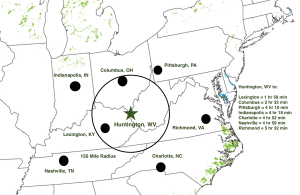 When I first heard that response, I felt like the wind had been knocked out of me. And it was such a simple reply to a challenging question. When I got my breath back, I breathed a sigh of relief. In that moment, it felt like we were wide open in what the future could hold for the church. I’ve been trying to hold onto that feeling ever since.
When I first heard that response, I felt like the wind had been knocked out of me. And it was such a simple reply to a challenging question. When I got my breath back, I breathed a sigh of relief. In that moment, it felt like we were wide open in what the future could hold for the church. I’ve been trying to hold onto that feeling ever since.
And so we tried to share this idea with our friends in Huntington: Just because the church may look different in the future than what we’re used to doesn’t meant it isn’t still the church. Some things may certainly have to change, and maybe it is even us who have to do some changing, but the gospel remains the same.
We reminded ourselves that we worship a God of resurrection — a God who brings new life out of the places of death, decay and brokenness — and in that there is great promise for our most desperate struggles.
We talked about Isaiah 43, where we are reminded God is doing a new thing. “Do not remember the former things or consider the things of old, God says. … Move on. See what I’m doing now!”
We talked about the man in John 5 whom Jesus asked, “Do you want to be made well?” This story shows us it can be difficult to live into one’s own healing and Jesus didn’t assume this man who had been lying there for so many years wanted to be healed. He allowed him to make a choice.
‘Do you want to be made well?’
And, I believe, Jesus asks us the same thing: “Do you want to be made well? Are you willing to do the work that will be required of you to live into your healing — even if that healing looks nothing like what you’re hoping or expecting? Jesus can bring us to a place of healing, but he asks us to get up, pick up our mat and walk. That takes a lot of effort when we’ve been used to lying around, waiting for someone else to rescue us.
“That takes a lot of effort when we’ve been used to lying around, waiting for someone else to rescue us.”
We challenged our Huntington friends, all the while knowing we were facing those same challenges ourselves.
This is a hard world in which we find ourselves these days, and it’s not just the church that seems to be changing from moment to moment. There is so much that is hard to recognize — so much that no longer seems familiar to us. And we need a companion on this journey.
While we were there, I began to wonder where were the local churches in Huntington. Where were the churches in their local association? Why weren’t they supporting or encouraging and helping this church? My fear is that entirely too often churches seem much more likely to compete with one another than encourage one another. Or maybe we just aren’t paying enough attention to one another. We each want to have the biggest offerings and the greatest attendance.
We shared with our friends in West Virginia that we were not there to build the kingdom of Harrisonburg Baptist Church but to work together to build the kingdom of God — and that is work we’re called to do together. We’re all on the same team.
Applying the lesson back home
Then I started wondering if there might be churches in Harrisonburg who are struggling. With the challenges of the last few years, that is very possible. Am I even aware of what the churches in my own backyard are facing? Do they also need someone to encourage them and walk this journey with them?
We didn’t solve the problems of our Huntington friends any more than reading Hopeful Imagination solved the struggles of Harrisonburg Baptist Church. But our church knew we didn’t stand alone. And they know in Huntington that they do not stand alone either.
I can’t tell you how many times in the months since our trip folks from our team have asked how my dad’s church is doing and reminded me that they are praying for my mom and dad and the church.
Our team that went to West Virginia did not just see the same church I remembered from my adolescence. They didn’t just see the same old fellowship hall where we had so many church dinners and youth lock-ins. They didn’t just see the same old hometown where I had grown up.
They saw the Huntington of today and the challenges the town faces now. They saw empty factories that once stood strong and offered so much security to the city. They saw neglected homes and neighborhoods that once were filled with kids playing and laughing. They saw a community I had once known as thriving and growing but now struggling in the grips of an opioid epidemic on all sides. They saw a church whose buildings had outgrown what the congregation was able to care for.
But they also saw hope. They saw the promise of a new day. They saw members of a community and church who haven’t yet given up. And they saw a prime opportunity for the God of resurrection and new life to deliver on those promises.
As we have gone on living our lives in Harrisonburg, we continue to pray for my parents and the church they have led for so many years. But we pray with our eyes open, looking for the churches and congregations in our own community that don’t need us to be their competitors but need us to be the encouragers God has called us to be. Let’s work to build the Kingdom of God together.
Eli Withers serves as associate pastor of Harrisonburg Baptist Church in the beautiful Shenandoah Valley region of the state of Virginia. She enjoys watching movies, reading books, playing with art and being outside — especially wherever there are wildflowers.
Related articles:
Your church after COVID: Restart, refresh or relaunch? | Opinion by Bill Wilson
What if Americans go looking for spiritual renewal and our churches are too troubled to help? | Opinion by Bill Leonard
10 observations about church health for the next chapter of ministry | Opinion by Barry Howard

